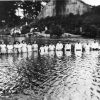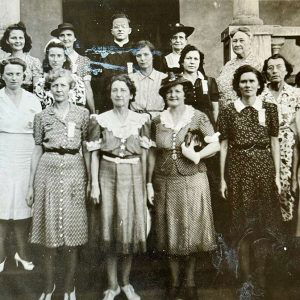calsfoundation@cals.org
Catholic Women's Union of Arkansas
The Catholic Women’s Union of Arkansas was an auxiliary to the Catholic Union of Arkansas, an organization founded by German Catholic immigrants. Discussions began in 1917 to establish a separate women’s group, but the chapter could not be organized at Morrison Bluff (Logan County) until October 8, 1919, due to World War I. The first president was Theresia Wewers of Morrison Bluff, and the auxiliary immediately began holding joint annual conventions with the Catholic Union. The group was also affiliated with the National Catholic Women’s Union.
A revised constitution adopted in 1938 stressed the non-political nature of the group, pledged dedication to the Catholic Church as well as the state and national constitutions, and vowed to work for social justice in the model of Jesus Christ. Affiliated societies included Adona (Perry County), Atkins (Pope County), Barling (Sebastian County), Charleston (Franklin County), Clarksville (Johnson County), Conway (Faulkner County), Dixie (Perry County), Engelberg (Randolph County), Hartman (Johnson County), Hoxie (Lawrence County), Jonesboro (Craighead County), Knobel (Clay County), Morrilton (Conway County), Paris (Logan County), Paragould (Greene County), Pocahontas (Randolph County), Prairie View (Logan County), Ratcliff (Logan County), St. Vincent (Conway County), Shoal Creek (Logan County), and Weiner (Poinsett County).
In addition to having its own spiritual advisor, the group submitted a yearly plan of action directly to the bishop of the Diocese of Arkansas for his approval. The work of the organization included material support to foreign and domestic missionary work (including cash donations, religious texts, and bandages and garments created in sewing circles), to Catholic schools and the state seminary, and to the Arkansas Tuberculosis Sanatorium in Booneville (Logan County), as well as education efforts in local study clubs and the printing of pamphlets and prayer cards. The group assisted young mothers with a milk fund and a maternity guild, which helped with housework, food preparation, and the care of older children while women gave birth in the hospital. Contests with prizes (essay writing, public speaking, poster/button design) were held at a local level to encourage Catholic youth to interact with their faith. During the world wars, the group cooperated with the Red Cross and USO and afterward provided clothing, money, and food for those impacted in Germany and elsewhere. An appeal published in a 1938 convention program claimed that “many have become communists because sufficient aid for their maintenance could not be supplied from Catholic sources.”
According to M. L. Brophy’s 1940 dissertation, the Central Union seemed initially to embrace a role for women outside the home, arguing for protections for working women and viewing women’s role in politics as a foregone conclusion that should be harnessed for Catholic issues. By the 1960s, however, a narrative emerged in the group’s literature that portrayed the organization as a bulwark against radicalism in the Cold War. The spiritual advisor for the Catholic Women’s Union, Rev. Francis Weiser, claimed: “The foundation of the National Catholic Women’s Union had its motivating roots in a healthy reaction of the Catholic Central Verein against the dangerous principles and aims of the ‘feminist movement’ at the beginning of this century.”
The group continued to meet into the 1970s but was eventually replaced by other Catholic women’s organizations.
For additional information:
Brophy, M. L. “Catholic Central Union.” Catholic Encyclopedia. Washington DC: Catholic University of America, 1967, pp. 265–267.
———. “The Social Thought of the German Roman Catholic Central Verein.” PhD diss. The Catholic University of America, 1941.
“The Catholic Women’s Union of Arkansas.” Program of the Golden Anniversary Convention of the Catholic Union of Arkansas and the 22nd Annual Convention of the Catholic Women’s Union of Arkansas. Little Rock: Paragon Printing, 1940, p. 55.
“Fifty Years of Catholic Action.” Program of the Catholic Women’s Union of Arkansas: A Lay Apostolate for the Missions, 1919–1969. Charleston, AR: 1969, pp. 8–19.
“History of the Catholic Women’s Union of Arkansas.” Program of the Catholic Central Union of American 105th Annual Convention and National Catholic Women’s Union 44th Annual Convention. Little Rock: 1960, pp. 25–27.
Lohr, Mary Filser. “The National Catholic Women’s Union.” Souvenir Program of the Forty-eighth Annual Convention Catholic Union of Arkansas and Twentieth Annual Convention Catholic Women’s Union of Arkansas. Little Rock: Paragon Printing, 1938, pp. 143–144.
Weiser, Francis. “The National Catholic Women’s Union.” Program of the Catholic Central Union of American 105th Annual Convention and National Catholic Women’s Union 44th Annual Convention. Little Rock: 1960, pp. 11–12.
Zernitz, Emilie R. “Fifty Years of Catholic Action: 1916–1966. National Catholic Women’s Union.” New Haven, CT: 1966.
Kathleen Condray
University of Arkansas, Fayetteville
 Early Twentieth Century, 1901 through 1940
Early Twentieth Century, 1901 through 1940 Religion
Religion Catholic Women's Union of Arkansas
Catholic Women's Union of Arkansas 



Comments
No comments on this entry yet.